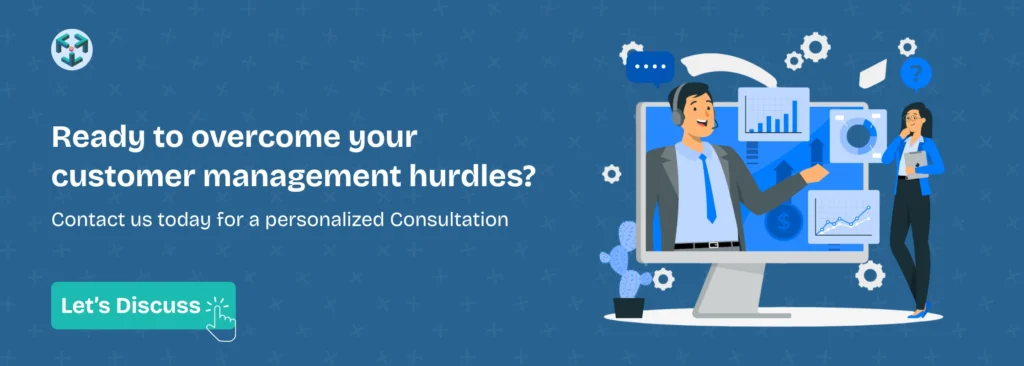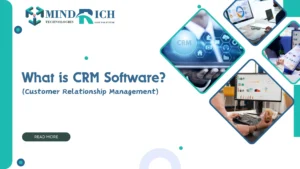Running a small business for small business or any business because you have to handle everything from sales to finance to customer services, that too within a limited team. Sometimes in this chaos, it’s often easy to lose track of your follow-ups, forget important client details or miss out on major opportunities. That’s where a CRM software for small business silently becomes a game-changer.
CRM stands for Customer Relationship Management, but it’s actually more than just a tool to store the contacts. Just think of it as a digital assistant that helps you to manage your client interactions, follow-ups, sales pipeline and even team collaboration, all of them in just one place.
For small businesses, the biggest merit of CRM is clarity and consistency. Whether it’s remembering whom you called last week, sending the right business proposal on time or even knowing which lead is close to convert; a good CRM software for small businesses keeps everything organized without needing a big team or high budget.
It’s not about just using a “fancy system”, It’s about building better customer relationships, reducing confusion and making smart and right decisions. And in this competitive market, best ERP & CRM development company can make all the difference.
Why Investing in a Reliable CRM Solution Really Matters?
Small businesses often hustle a lot like small teams, too much manual tasks, scattered customer info and missed follow-ups. That’s why getting a reliable CRM is not just about adding another software, instead it’s about bringing a proper structure, automation and accuracy to your everyday work.
A good CRM helps you:
- Centralize customer interactions
- Track every lead and follow-up
- Improve team coordination
- Stay consistent with your setup
In short, it’s actually a foundation for growth. The earlier you build it, the better your business improves over time.
Also Read: What is CRM Software (Customer Relationship Management)?
Choose The Right CRM Software for small business
Now, before you even start exploring different CRM modules, just pause and ask yourself one simple question: “What problems am I trying to solve?”
Because that’s where most of the small business owners go wrong. They directly jump into a CRM software just because someone recommended it to them or maybe a free trial looked more fascinating. But without any clarity of your goals, even the best CRM software won’t do much wonders.
- Are you struggling with your missed follow-ups?
- Is your sales team not aligned in the right order?
- Do you want to understand your clients better?
- Or maybe you just want to have a better way to manage the leads?
Always be honest about your current challenges or problems. You can even make a simple list of what frustrates you the most about your current setup whether it’s the manual entries, separate customer info or a zero visibility of your sales funnel.
Once you’re clear about your needs, choosing the right CRM becomes 10x easier for you. You won’t get distracted by any fancy features or complicated dashboards. Instead, you’ll only focus on what modules actually help your business run smoother.
Just remember one thing: The right CRM software for small business wouldn’t be the one with the most features or tools. It’s the one that will solve all your problems without creating any confusion.
Key Considerations When Choosing CRM Software for Small Business
Whenever it comes to choose a right CRM software for small business, most small business owners fall into two major traps:
- Either they will go for the cheapest option without checking if it actually helpful for their business needs,
- or they just pick a big-popular software with many unnecessary features they’ll probably never gonna use.
Here’s the reality, You don’t need the biggest CRM. You just need the right CRM.
Things to keep in mind before choosing the CRM software for Small Business:
- Easy to use for you as well as for your team
- Flexible and Adaptable
- Mobile accessible
- Affordable and Scalable
Before going for a permanent CRM software for small business, just start by trying out a few free trials or a demo. Examine them. See what tools feel comfortable. Because if it feels too complicated right from the beginning, your team will generally avoid it and that will defeat the whole purpose.
Some CRMs are built specifically for small businesses only; they usually focus on day to day contact management, sales pipelines, reminders and alerts and follow-up tasks. That’s all you really need in the beginning.
Don’t chase fancy features. Chase simplicity. Because the best and simple CRM is the only one that your team actually uses, not just the one which looks fancy on paper.
CRM Implementation: A Step-by-Step Guide for Small Teams
Since you’ve picked the right CRM, now comes the most important part that is how to actually use it properly. Most small businesses usually get excited at the start but somewhere while “setting it up” and “actually using it daily,” things start to fall apart. That’s why a simple, clear step-by-step plan is always a need.
Here’s some major and useful guide to get started:
1st Step: Clean Your Existing Data
- Before integrating anything into your CRM, always clean up your current contact list.
- Remove duplicate numbers, fix wrong numbers and update missing info.
- because, Messy data = Messy results.
2nd Step : Set Up Basic Structure
- Create a simple channel for your sales process like:
- New Lead → Follow-up → Proposal and Details Sent → Deal Closed
- Also, you can define user roles too: who will use the CRM and for what purpose.
3rd Step: Import the Right Data
- Only keep what you need — leads, customers, their contact details, last interaction details
- You don’t need to put every single file from your laptop into it.
4th Step: Always Start Small (Use It With One Team First)
- Let your sales, support and marketing team use the CRM first.
- Observe how they actually use it, where they get stuck and what feedback they give.
5th Step: Train Your Team Before Going Live
- Once the test start works well, train the rest of your team.
- Don’t expect perfection at the beginning, be open to adjusting things.
- The best setup is always the one your team finds easy to use and useful.
That’s it, these five simple steps. You don’t need to hire an IT expert or watch tutorials. You just need to take it slow, keep it simple and stay consistent. CRM software success only comes from daily use and small improvements.
How CRM Software for Small Business Really Works?
CRM success never comes from buying software, it always comes when your team actually uses it rightly. And that will only happen when they’re trained properly and feel comfortable while using it. Start by showing them the basics like: how to add leads, update follow-ups and check daily tasks. Keep it real, no technicalities.
But training your team isn’t a one-time event. Your presence has to stay involved. Every few weeks, take 15-20 minutes to sit with your team. Ask them simple questions:
- Is the CRM making their work easier?
- What tools and modules feel confusing?
- What can we fix?
Your CRM setup will never be perfect on Day 1 and that’s completely okay. What matters is that you keep improving it with your team, not just for them.
When your team is involved, trained and using it wisely, that’s where CRM stops feeling like a tool and starts working like a real and major part of your business.
Explore about What is Odoo Software? The Ultimate Guide to Odoo ERP
Common Mistakes to Avoid While Implementing CRM
Sometimes even with the right CRM and strategy, mistakes can often disturb the entire setup. So, to avoid them, here are common hazards to watch out for:
Doing too much at once
One of the biggest mistakes is trying to implement everything at the same time. Never do that. Always start small, maybe with just one team or one process. Because, CRM is not a race, it’s a system that grows with your business.
Skipping team training
Your CRM will only work when your team knows how to use it. A lot of businesses skip training thinking that the software is easy but every system needs proper walkthroughs. So, don’t just train once and forget it. Keep helping your team with regular tips and support.
Over-customizing
CRM tools offer a lot of customization but that doesn’t mean you need to change everything. Stick to the default setup at least in the beginning. Add new features or customizations only when they’re actually needed for your setup.
No testing
Always do a trial run test before making your CRM live for everyone. First, test it with a small team to make sure the process works as expected. This will help you to catch small bugs and issues early on.
Choosing the wrong partner
If you’re working with a CRM consultant or any vendor, make sure they understand both the CRM and your business. Ask them for relevant examples, case studies, and real experience. The right partner will guide you in making the right decisions as your business grows.
Conclusion
At the end of the day, a CRM isn’t just a normal tool you use, it actually becomes a silent partner for your business growth.
It helps you to stay organized, improves your follow-ups, strengthens relationships with customers and brings responsibility to your team. But none of this happens overnight. It’s a whole process and like any process, it takes time, attention and better consistency.
The good news? You don’t need to be an IT expert. You don’t need a big team. You don’t need a fancy system.
What you truly need is:
- Better clarity on what you want to improve.
- A CRM that matches your business needs.
- A team that’s well trained and supported.
- A habit of tracking and improving your setup over time.
Always think of a CRM as a long-term investment, not just a software for your business stability and growth. Small businesses who use CRM wisely often see big improvements later in their work and services.
So if you’re still managing your operations with scattered spreadsheets, old notebooks or even in WhatsApp messages then this is your perfect sign to level up. Because CRM software for small businesses isn’t just about managing your customers instead it’s about managing your business better.










